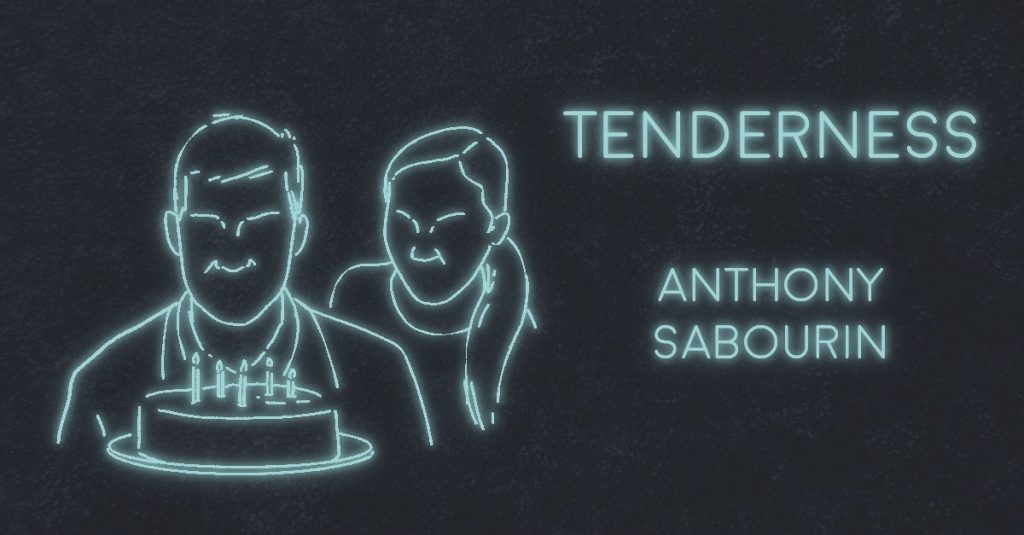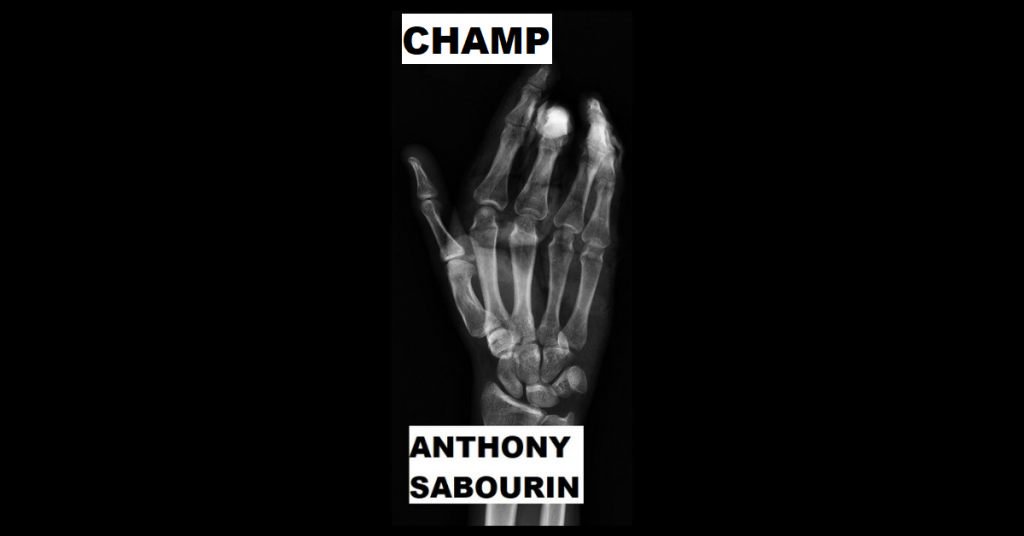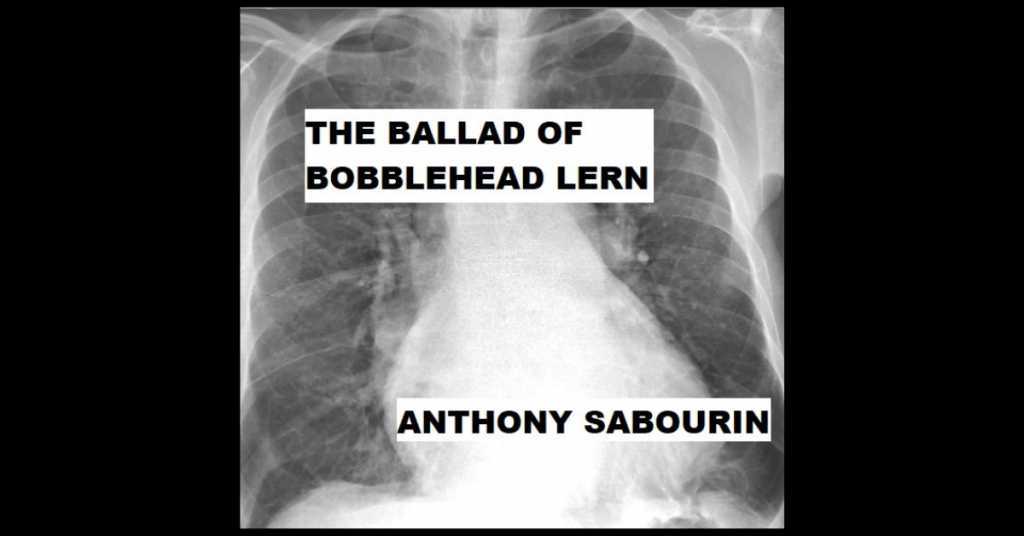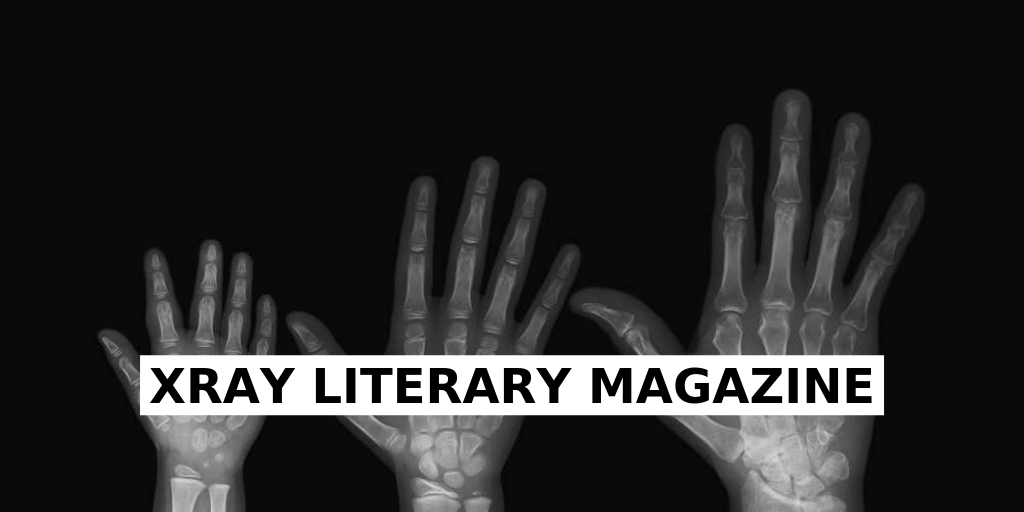
TENDERNESS by Anthony Sabourin
The Doomsayer is at work.
He takes a sip of black coffee from a styrofoam cup. He mumbles to himself and barks like a dog and screams into his elbow as one would muffle a cough. He takes another sip of coffee, gargling it and spitting it into the street; wipes his mouth with the back of his hand. Across the street the train is stopping, and soon the morning rush will be streaming by on the stretch of street before him, walking in their harried steps, a tension in the inconvenience of being a person around other people, already impatient to hasten the day’s end before it’s begun. The Doomsayer adjusts his pants and trench coat, picks up his cardboard sign, and steps upon his milk crate. He shouts the words on his sign.
“The end is nigh!”
Faces look up to see.
“The world is almost over!”
***
The Doomsayer worked early and all day, taking lunch at 10 am and as many bathroom breaks as he could finagle out of the decrepit Subway across the street, where he was engaged in a bitter feud with the manager, a weaselly man named Laramie. He would be home in time for dinner with his wife, a sturdy and freckled woman who stunk from her work at the smelting plant, whom he loved completely.
It was a good life, and the Doomsayer found joy in his work. He was passionate about the end of the world, and while he was aware that his message was difficult to accept, for a long time he lived for even the most tacit acknowledgement of the words that he raggedly shouted to the idiot faces of the people who worked in glass and steel buildings. Even the most furtive of glances would satisfy him for weeks.
He remembered with great fondness one particular day when a car broke down in front of his preaching stoop. —his cracked yelps painting a picture of the end, of how the resolute corporate leaders of the past were long dead, and how their doughy and cow-eyed offspring could only lead us more swiftly to our certain doom; that unchecked plague had emaciated the horses and left the goats vomiting in the city’s neighboring fields, and how more and more these days the rain was actually just acid that left the asphalt smoking after a storm. He supplemented his arguments with credible first-hand analysis of various religious texts. And with the tow truck loaded and ready to leave, as the Doomsayer asked out of professional courtesy if this mother and her child would at least acknowledge if they, on the basis of the case the Doomsayer had presented to them, thought that the world would end, was it not true that their heads, as the truck jerked and pulled away, bobbed in a manner that was markedly similar to a nod? For so long this had been the highlight of the Doomsayer’s career, so much so that yearly his wife made him a rum cake to mark the anniversary of the occasion.
—after the black clouds of the chemical factory had intermingled with and covered the skyscrapers with soot, and all was darkness except for the fires from neighboring cities—that crowds began to form. Only now—as the syphilitic ramblings of the city’s mayor failed to placate them—that the crowds gathered to listen to the Doomsayer.
“Have we passed the point of no return?” he asked the crowd.
“Yes!” the crowd shouted back at him.
“Do the penguins now slide into the muddy ocean from the floes of our own garbage?”
“Surely!” they cried.
“What happened to all of the good animals? The noble giraffe? The whimsical flying squirrel?”
“All of the good animals are extinct!” the crowd said.
“And what of the new animals humankind discovers? Those weird fangy monstrosities they fish out of the bottom of the ocean? With their glowing eyes and spiked, skeletal bodies - what do we make of mother nature’s nightmares?”
“Only abominations remain!” the crowd cheered.
“No!” the crowd chanted in ecstasy.
“And what of our neighbors? Can we depend on the slack-jawed inbreds to the east and west of us for salvation in our hour of need?”
“Our neighbors can only be depended on for war and death!” the voices boomed.
“What have we done to our planet?” he would shout at their faces.
“We’ve wasted it!” the crowd would wail.
It was a true golden age.
Yet, after years of plying his trade in obscurity, the Doomsayer felt a sense of emptiness in his newfound success. The work came to him easily now, and he longed for the days when convincing people that the world was ending was a challenge. He had taken to rolling in the garbage in the alley by the Subway, thinking the rank juices dripping from his trench coat would make his message less sensible, but still, the crowds grew.
Only a seasoned observer would have been able to tell that his rheumy eyes were sad and not sick, his voice still full of fury but devoid of passion, his malaise not directed at the end of all things, but at himself and his lack of joy in this—his moment of triumph. The closest thing the Doomsayer had to such an observer was the dreaded Laramie, who mistook these changes as sure signs of the imminent death of his rival. Over a sandwich made for the Doomsayer with open contempt, they conversed:
“Is your death near?” the scoundrel Laramie asked him.
“Is yours?” he spat at his enemy.
“I am a picture of health,” Laramie said, and the Doomsayer did acknowledge to himself that Laramie’s long neck, bulbous head, and tiny limbs still wriggled about the vandalized sandwich counter with the ease of a younger man.
“But you—” Laramie continued. “Your new friends out there may not notice the change, but I have seen how your voice falters, how your eyes have turned splotchy, and your gestures uncertain. I have seen your skin grow pale and your body rebel with stink as it rots from the inside. I want you to know that I relish it!”
“If I appear ill,” the Doomsayer said, “it is no doubt from the stagnant meatballs and moldy cheese I ingest from this, the foulest of the Subways.” He took a bite of the sandwich and chewed it slowly. “But I want you to know, Laramie, that this food is the small dose of poison that grants me the immunity I need to endure your presence, and upon your demise I will lead your family to this failed enterprise to celebrate my ultimate victory.”
It would take another half hour of negotiations before the Doomsayer could use the bathroom.
After facing an afternoon of the cheering crowds, there was little relief for the Doomsayer among his own kind, for even at the Lazy Susan—where the drink special of a free rotisserie chicken with the purchase of a pilsner openly courted the castoffs of society—the company of his fellow harbingers, soapbox criers, suspected deities, and lesser prophets greeted him as a celebrity.
He drifted about in the whorl of voices with his pilsner and a drumstick—
Majestic tirade out there—buy you a drink you’ve earned it—the voice it’s his voice how he uses it he can—goes to show that hard work pays off in the—did you see the garbage he rolls in a stroke of genius—Kevin, I’m—it adds so much resonance you know he’s the garbage we’re the garbage we’ve wasted it—used to be humble too good to drink with the Kevins now—I think it’s his sign you need the right message—location is the key—no, I’m not Kevin I’m Carl you know, the conspiracy of dust that’s mine—all hard work that’s the key—The end!—It will never end it can’t—so proud of him I taught him the ropes and he—buy you a beer whatever you want —is nigh!—such persistence, it couldn’t have happened to a better guy he’s—
—running his fingers along the arches spine of Susan IV, the tavern cat about on her rounds—
It’s really him he comes here—yeah of course the end of the world—eat the rich that’s my thing I pass out pamphlets—where did you get that cloak it’s really thick—when he bellows it shakes the earth—they eat out the palm of his hand how articulate—the geese there are too many of them that’s my thing—K-E-V-I-N, I’m the second coming get you the right cloak—the end is nigh!—I found out they all huddle together close to the lake and I try to convince them to drown but the geese don’t ever—the end is nigh!—No I’m Carl the dust it—listen—you’re a Kevin I’m a Kevin—THE END IS NIGH!—oh every night this chant—THE END IS NIGH!—they never listen—THE END IS NIGH!—the rich you gotta eat them I hand out recipes—THE END!—dust building never stopping—IS!—the voice it’s—NIGH!—can’t hear you these chants—THE END IS NIGH!—the dust builds and it can’t - no listen –THE END IS NIGH!—it builds—THE END IS NIGH!—THE END IS NIGH!—THE END IS !
—looking out at still more expectant faces, the bedraggled and cloaked and rag-covered fellow cranks, he never knew what to tell them. He had nothing to say. He lifted up his beer to his fellow colleagues in a gesture of goodwill, chugged it down, and left to more cheering.
Outside he was accosted by one of the newer criers, a weathered boy who carried pamphlets of recipes for how to eat the rich, which he distributed to the university students downtown.
“Wait!” he said, grabbing the Doomsayer’s arm.
“Eat the rich! How is that going?”
“The University guards and their truncheons do not support cannibalism but I can still outrun them,” the boy said.
“Ah that’s good. You may want to use your pamphlets as padding, if they ever do catch you.”
"I appreciate the wisdom, sir. And, I apologize for grabbing you just now but please, do you have a moment to discuss the end? I feel like there must be something more to it. I have to know what is next.”
“Next?”
“Don’t pretend. These people, they look to you now because you knew, and because you knew, surely you must know what happens next. There must be something. Please, I beg of you— help me out here, I mean I’m just starting and even with just a nugget of your foresight I could build a whole new-”
“There is no next.”
“What?”
“The end is it. One day it will all be over with and done and that’s it. That’s the end of it all.”
The boy fell silent and his shoulders dropped into a slump. “Oh,” he said. The Doomsayer left him by the neon lights of the Lazy Susan, and walked home to his wife.
Home and seated for dinner, the Doomsayer realized it was the day of the cake. The Doomsayer had forgotten, but now here it was, his wife bringing it into the dining room and setting it out on the table. The rum cake is a glistening oversized donut shape from the bundt pan, with two candles representing the woman and her teenage child from that halcyon day years past.
He tried to make a happy face.
“What’s that, all of those things your face is doing?” his wife asked.
“I am just so moved by this gesture. The rum cake, I appreciate it so much I just.” The Doomsayer blew out the candles to keep from crying. He cut two pieces of rum cake and set them onto plates as listless smoke filled the room.
“Oh, so we will eat the cake in this very sad manner,” his wife said.
“No, I am happy, I love this delicious cake,” the Doomsayer said with a full mouth, chewing as his eyes began to water.
The Doomsayer’s eyes said that nothing was wrong, only this was unconvincing, because they were spilling tears, and suddenly he was breathing heavily and having a panic attack while still trying to eat the cake. His wife went into the kitchen to pour him a glass of water, and throughout the Doomsayer was trying to comport himself as though he were not having a panic attack, his body shaking as he swallowed cake between gasps of air, all of it becoming increasingly ridiculous. With his full mouth he sobbed “I no longer love what I do.”
His wife laid the water on the table and held him. She cooed into his ear: “Ah so what you love has turned into work, eh? Woe unto the prophet now that his obscure and cool new future is the common present. Shush, my idiot baby. You think I do not see this at the smelting plant? Some people stare at the glowing ore until it takes their minds away. You just need to take a vacation.”
“A vacation,” the Doomsayer said with wonder. The very concept seemed alien to the Doomsayer, but immediately his panic faced relaxed and his eyes brightened, and he again seemed at peace. They went back to eating their cake, which was very strong, and it led naturally to their lovemaking, their cries frightening the squirrels who had overtaken and were developing complex structures with the garbage they were collecting in the field beyond the Doomsayer’s home.
In the morning he purchased a plane ticket and packed his bag, soon finding himself on a propeller plane rocketing in its arc towards the Republic of Vronsk, a coastal city known for its decommissioned oil rigs, incomplete skyscrapers, and beautiful beaches, with sand as white as the Doomsayer’s knuckles as he experienced a screeching stop on the ramshackle landing strip of the Vronsk airport.
Vronsk was beautiful. The Doomsayer wandered around the city in a Hawaiian shirt and dollar store sandals, marveling at a sky that wasn’t grey-black. He fed beef jerky to the mongrel dogs, who began to follow him around.
He gazed up at an unfinished condo, whose main level was ransacked, and whose upper levels gave way from glass and concrete to upright metal beams that stabbed at nothing, razed manmade exclamation marks surprised that this was their end. As he walked up another block to see another interrupted building, he heard the familiar sound of a voice yelling in the street. Feeling the pangs of homesickness, he walked to the source of the shouting.
“It’s over!” the voice cried out. It was a Vronskian woman with a shaved head, wearing a metallic bouffant dress. She was gesturing to the great and unfinished skyscraper above her, which the Doomsayer had to admit was a nice touch. A crowd was forming.
“The sun shines weaker every day and the ocean rises ever more swiftly to swallow up Vronsk!” she shouted. “Our street dogs outnumber our children! And in their canniness they slip into our houses and lie in their beds!”
Voices murmured in agreement.
"Our leaders have been rendered fetus-like from inbreeding! Drought has crippled our farms and clouds of locusts rattle against our windows in the night! The word is ending!” she shouted. The Doomsayer found the material to be very strong, and he enjoyed being present in the throng of people who shouted in recognition.
“The world is ending!” he heard the woman say. All around the Doomsayer was a sense of good cheer. The woman basked in the jubilation for a moment, but she cut the crowd short. “It is ending! But is this enough?” she asked the crowd.
“No!” They shouted back.
“No!” the woman said. “For the end is not coming soon enough. We must act!” she preached. Members of the crowd raised their fists in the air.
“We must destroy!” she shouted. “We must waste! More garbage! More fires! The end is in our hands and we must never waver!” she screamed. “We must be resolute! The end is now!” The crowd was rapturous. The glass in the skyscraper was mirrored like the back of a bar, and reflected in that mirror the Doomsayer saw an old man in a Hawaiian shirt. He felt as though he were in a foreign church. The dogs followed him as he left the crowd.
The Doomsayer meandered beachward, stopping to buy postcards at a souvenir shop. On the back of a postcard featuring art depicting a more optimistic Vronsk, with the sun setting and playing off of completed skyscrapers, he wrote a series of threats addressed to Laramie. Then, on a postcard depicting a series of minerals native to Vronsk he addressed to his wife a poem of longing. He continued on, mailing the postcards and, at a corner store, buying a jug of brackish wine which was described to him as a local delicacy.
From the beach looking towards the ocean, the decommissioned oil rigs lounged in the distance like ugly mechanical swans. The Doomsayer laid on a towel in the sand with his dogs and an open package of beef jerky. He was sharing the jug of wine with a couple who had seated themselves next to him. They were honeymooning in Vronsk, which was very affordable, and they overlapped against each other like sunning seals, languid curves supine and happy. They reminded the Doomsayer of earlier days with his wife, and he radiated happiness and goodwill towards the loving couple, and refrained from mentioning the imminent end of all things.
They watched people in swimsuits splash in the waves; the new wife and husband periodically wading into the water, and as the jug emptied the afternoon passed in the lazy and relaxed way that beach days pass when the sun is out. Bony birds circled overhead, and shade from the palm trees retreated to the street.
A commotion arose in the water. From people-watching and the overheard snatches of conversation, it became clear that a woman playing in the waves had lost her wedding ring. She lay sobbing hunched over herself in the sand, and an improvised search party was formed, with bodies launching themselves headfirst into the surf, legs akimbo, looking in the sand underneath the waves for the lost ring. The newlywed couple next to the Doomsayer were recruited into the search, and the Doomsayer offered to stay behind to watch over their things. He threw beef jerky to the dogs and watched the futile pattern of the people in the waves, as over and over legs would appear out of the water, and would wriggle about in the air until submerging, and after a beat, like a magic trick, an apologetic face would emerge.
Suddenly a siren wailed from the beach, and a fissure of water erupted from one of the oil rigs in the distance. The Doomsayer watched as the rig furthest to the left began its collapse, metal sweeping into the water, the rig’s mast dipping at a dangerous angle and toppling into the adjacent rig. The shriek of metal-on-metal reverberated with the siren in the air. Waves grew larger and crashed to the shore and people retreated to the sand. The search was over.
Eventually the newlywed couple returned to the Doomsayer, where they admitted that the ring was likely lost for good. The Doomsayer stayed on the beach though, watching as the rigs toppled like slow motion dominoes into the greedy sea. The sound they made was mournful. The sun dipped below the horizon, disappearing into a blood-red wink.
Alone with the mongrel dogs on the beach, the Doomsayer turned around to face the street, and he noticed how the people were moving in the moonlight like pallbearers in search of a body. Everywhere there was garbage. He returned to the view of the lapping waves, and he found himself wading into the water, and his head disappeared into the sea.
The dogs watched the waves.
A pair of pale legs popped upright into the air, calm and balanced despite the waves.
The conspiracy of dust carried on unabated.



